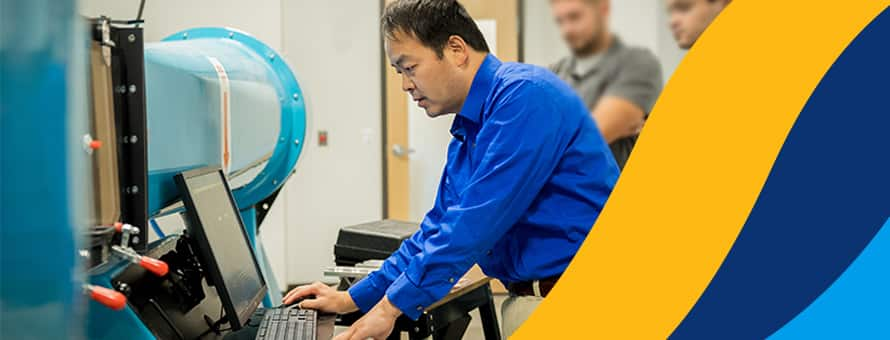What is Aeronautical Engineering?

Understanding the numbers
When reviewing job growth and salary information, it’s important to remember that actual numbers can vary due to many different factors—like years of experience in the role, industry of employment, geographic location, worker skill and economic conditions. Cited projections are based on Bureau of Labor Statistics data, not on SNHU graduate outcomes, and do not guarantee actual salary or job growth.
If you’ve ever dreamed of designing the next generation supersonic airplane or watching the biggest jet engine soar, you may have considered a career in aeronautical engineering. Here are some fundamental questions to help you decide if the field is right for you.
What is Aeronautical Engineering?
 As David Guo, associate professor of aeronautical engineering for Southern New Hampshire University's (SNHU) School of Engineering, Technology and Aeronautics (SETA), put it, aeronautical engineering is “the branch of engineering that deals with the design, development, testing and production of aircraft and related systems.”
As David Guo, associate professor of aeronautical engineering for Southern New Hampshire University's (SNHU) School of Engineering, Technology and Aeronautics (SETA), put it, aeronautical engineering is “the branch of engineering that deals with the design, development, testing and production of aircraft and related systems.”
Aeronautical engineers are the talent behind these systems. This type of engineering involves applied mathematics, theory, knowledge and problem-solving skills to transform flight-related concepts into functioning aeronautical designs that are then built and operated.
In practice, that means aeronautical engineers design, build and test the planes, drones and helicopters you see flying overhead. With an eye on the sky, these workers also remain at the forefront of some of the field’s most exciting innovations — from autonomous airship-fixing robots to high-flying hoverboards and solar-powered Internet drones.
Aeronautical vs. Aerospace Engineering: Are They the Same?
There is a common misconception that both aeronautical and aerospace engineering are the same, but aerospace engineering is actually a broader field that represents two distinct branches of engineering:
- Aeronautical Engineering
- Astronautical Engineering
According to the U.S. Bureau of Labor Statistics (BLS), aeronautical engineers explore systems like helicopters, planes and unmanned aerial vehicles (drones) — any aircraft that operates within Earth’s atmosphere. Astronautical engineers, meanwhile, are more concerned with objects in space: this includes objects and vehicles like satellites, shuttles and rocket ships.
What Do Aeronautical Engineers Do?
“Aeronautical engineers develop, research, manufacture and test proven and new technology in military or civilian aviation,” Guo said. “Common work areas include aircraft design and development, manufacturing and flight experimentation, jet engine production and experimentation, and drone (unmanned aerial system) development.”
According to the American Society of Mechanical Engineers (ASME), as the industry evolves, so does the need for coding. With advanced system software playing a major role in aircraft communication and data collection, a background in computer programming is an increasingly valuable skill for aeronautical engineers.
BLS also cites several specialized career tracks within the field — including structural design, navigation, propulsion, instrumentation, communication and robotics.
What Kind of Employers Offer Aeronautical Engineering Jobs?
“Major aerospace manufacturers like Boeing, Pratt-Whitney and Sikorsky are just a few companies that hire qualified aeronautical engineers,” Guo said.
The National Aeronautics and Space Administration (NASA) also hires 20 different types of engineers, with aerospace engineering being one of the most common fields. According to its site, NASA specifically looks for team players who use a holistic approach when it comes to solving problems.
Reports from the BLS found that 32% of aerospace and aeronautical engineers worked for a product and parts manufacturer in 2021. Other top employers in 2021 included:
- Government agencies (18%)
- Engineering services (15%)
- Navigational and control instrument manufacturing (10%)
- Research and development companies (9%)
BLS also estimated a 6% job growth through 2031 due to the field’s growing focus on reduced noise pollution, as well as improved fuel efficiency and safety.
What is a Typical Aeronautical Engineering Salary?
 Given the demands of the field, you’re probably wondering how much aeronautical engineers make. BLS reported that aerospace and aeronautical engineers earned a median salary of $122,270 in 2021, with the lowest 10% earning an annual wage of less than $77,440 and the highest 10% earning $168,370.
Given the demands of the field, you’re probably wondering how much aeronautical engineers make. BLS reported that aerospace and aeronautical engineers earned a median salary of $122,270 in 2021, with the lowest 10% earning an annual wage of less than $77,440 and the highest 10% earning $168,370.
By comparison, the annual median wage for all U.S. workers in 2021 was $45,760. With that kind of projected earning potential, along with job growth on par with the national average, the future's looking bright for those interested in a career as an aeronautical engineer.
How Do I Become an Aeronautical Engineer?
So how do you get your aeronautical engineering career off the ground? In many cases, you must complete a Bachelor of Science (BS) in Aeronautical Engineering program accredited by the Accreditation Board for Engineering and Technology (ABET). There are additional licensure requirements that vary by state. And, if you want to work on projects related to national defense, you may also need a security clearance.
“Historically, engineering education involves theory and application, with core topics supported by experimental labs to aid in physical understanding,” Guo said.
In some cases, these experimental labs are supplemented with experiential learning — from software simulations to navigating drones and even real flight testing. These hands-on experiences offer you the opportunity to experiment and gain a better understanding of flight theory, all the while having some fun, according to Guo.
A degree can change your life. Find the SNHU engineering degree that can best help you meet your goals.
Spencer Hensel is a copywriter in higher education. Connect with him on LinkedIn.
Explore more content like this article

How to Get Into AI: What AI at Work Looks Like for Beginners

Understanding AI Ethics: Issues, Principles and Practices

What is the Best Degree for an Artificial Intelligence Career?
About Southern New Hampshire University

SNHU is a nonprofit, accredited university with a mission to make high-quality education more accessible and affordable for everyone.
Founded in 1932, and online since 1995, we’ve helped countless students reach their goals with flexible, career-focused programs. Our 300-acre campus in Manchester, NH is home to over 3,000 students, and we serve over 135,000 students online. Visit our about SNHU page to learn more about our mission, accreditations, leadership team, national recognitions and awards.


